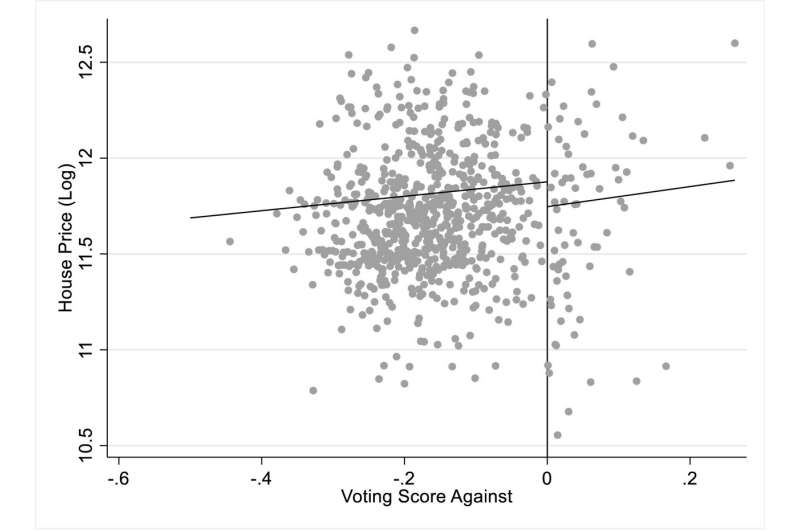Failure to pass fire levies can lower house values
Cuts to fire protection funding initially have a larger effect on home prices than crime, school quality, or environmental quality, but the short-term decreases don’t persist, the University of Cincinnati economists found.
David Brasington, Ph.D., and Olivier Parent, Ph.D., professors of economics at UC’s Carl H. Lindner College of Business, studied the effects of communities that don’t pass fire protection renewal levies on housing values for a research article that was published in the journal Regional Science and Urban Economics.
Brasington was surprised by how cuts to fire protection funding had a greater effect on housing prices than other factors.
“We were really surprised about it having an effect and the magnitude of the effect, too,” he said. “It was surprising to me, also, because schools get the bulk of funding, and police services are so important.”
To study the effects of funding cuts, Brasington and Parent analyzed data on house sales in Ohio between 1995-2006, the most recent time frame that data was available.
They focused on communities that, according to the U.S. Census Bureau, share similar demographic and economic characteristics. The only discernible difference was that some of them narrowly voted to renew tax levies while others narrowly voted against renewing their levies.
In the year after communities narrowly voted to cut fire protection funding, house prices dropped between 6.7% and 15.1%. That translates to an average decrease in house values of $15,000, while the tax savings for the life of the house is only $1,500.
“Not renewing is kind of a shock to the community,” said Brasington, who added it’s rare for Ohio communities to vote against fire protection levies.

While housing prices decreased after a failed fire protection levy, Parent and Brasington found the prices returned to their normal levels in those communities within a few years.
“There might be some effect the second year after the vote, but then normal levels return,” Brasington said. “You can’t tell the difference in house prices in cities that vote against the tax levies the third year, fourth year, or fifth year after the vote. But there’s a temporary blip in house prices.
“Our guess is that a big factor in the drop of house prices initially is fear, fear of increased risk of fire. But what happens in Ohio is every fire department supports the other. If there’s a fire in [one area], the fire departments from [neighboring communities] and anywhere close by send fire trucks to help each other through mutual assistance agreements. The actual protection from fires is good, even if a tax levy fails, probably because of these mutual assistance agreements.
“Our guess is people are afraid of the decrease in services at first, then after a couple of years, they realize, “Well, there hasn’t been any big change in actual fire protection.'”
The effects of fire protection cuts are the opposite of cuts to park funding, which Brasington previously studied.
Brasington found Ohio communities that voted to renew parks and recreation spending see 13% higher home values three years after the vote than similar communities that voted against the tax renewals. While cuts to park funding initially didn’t have an effect on house prices, the effects grew in the following years.
“The parks and recreation cuts take a while to be noticeable, whereas the fire protection failure drops house prices right away but doesn’t persist,” Brasington said. “They’re like the opposite sides of a coin.”
For both parks and fire protection, Brasington said, the studies show that those services matter to residents and are worth the investment.
More information:
David M. Brasington et al, Fire protection services and house prices: A regression discontinuity investigation, Regional Science and Urban Economics (2024). DOI: 10.1016/j.regsciurbeco.2024.103984
Citation:
Failure to pass fire levies can lower house values (2024, February 20)
retrieved 20 February 2024
from https://phys.org/news/2024-02-failure-levies-house-values.html
This document is subject to copyright. Apart from any fair dealing for the purpose of private study or research, no
part may be reproduced without the written permission. The content is provided for information purposes only.

Cuts to fire protection funding initially have a larger effect on home prices than crime, school quality, or environmental quality, but the short-term decreases don’t persist, the University of Cincinnati economists found.
David Brasington, Ph.D., and Olivier Parent, Ph.D., professors of economics at UC’s Carl H. Lindner College of Business, studied the effects of communities that don’t pass fire protection renewal levies on housing values for a research article that was published in the journal Regional Science and Urban Economics.
Brasington was surprised by how cuts to fire protection funding had a greater effect on housing prices than other factors.
“We were really surprised about it having an effect and the magnitude of the effect, too,” he said. “It was surprising to me, also, because schools get the bulk of funding, and police services are so important.”
To study the effects of funding cuts, Brasington and Parent analyzed data on house sales in Ohio between 1995-2006, the most recent time frame that data was available.
They focused on communities that, according to the U.S. Census Bureau, share similar demographic and economic characteristics. The only discernible difference was that some of them narrowly voted to renew tax levies while others narrowly voted against renewing their levies.
In the year after communities narrowly voted to cut fire protection funding, house prices dropped between 6.7% and 15.1%. That translates to an average decrease in house values of $15,000, while the tax savings for the life of the house is only $1,500.
“Not renewing is kind of a shock to the community,” said Brasington, who added it’s rare for Ohio communities to vote against fire protection levies.

While housing prices decreased after a failed fire protection levy, Parent and Brasington found the prices returned to their normal levels in those communities within a few years.
“There might be some effect the second year after the vote, but then normal levels return,” Brasington said. “You can’t tell the difference in house prices in cities that vote against the tax levies the third year, fourth year, or fifth year after the vote. But there’s a temporary blip in house prices.
“Our guess is that a big factor in the drop of house prices initially is fear, fear of increased risk of fire. But what happens in Ohio is every fire department supports the other. If there’s a fire in [one area], the fire departments from [neighboring communities] and anywhere close by send fire trucks to help each other through mutual assistance agreements. The actual protection from fires is good, even if a tax levy fails, probably because of these mutual assistance agreements.
“Our guess is people are afraid of the decrease in services at first, then after a couple of years, they realize, “Well, there hasn’t been any big change in actual fire protection.'”
The effects of fire protection cuts are the opposite of cuts to park funding, which Brasington previously studied.
Brasington found Ohio communities that voted to renew parks and recreation spending see 13% higher home values three years after the vote than similar communities that voted against the tax renewals. While cuts to park funding initially didn’t have an effect on house prices, the effects grew in the following years.
“The parks and recreation cuts take a while to be noticeable, whereas the fire protection failure drops house prices right away but doesn’t persist,” Brasington said. “They’re like the opposite sides of a coin.”
For both parks and fire protection, Brasington said, the studies show that those services matter to residents and are worth the investment.
More information:
David M. Brasington et al, Fire protection services and house prices: A regression discontinuity investigation, Regional Science and Urban Economics (2024). DOI: 10.1016/j.regsciurbeco.2024.103984
Citation:
Failure to pass fire levies can lower house values (2024, February 20)
retrieved 20 February 2024
from https://phys.org/news/2024-02-failure-levies-house-values.html
This document is subject to copyright. Apart from any fair dealing for the purpose of private study or research, no
part may be reproduced without the written permission. The content is provided for information purposes only.
